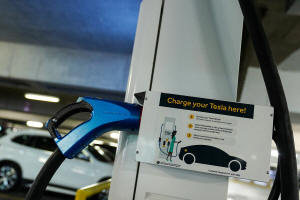|
The
announcement is the latest in a string of awards to boost EV
charging, as President Joe Biden's administration looks to
finalize new rules in coming months that could dramatically
boost EV sales.
The funds aim to help frustrated owners who find EV chargers out
of service, said Federal Highway Administrator Shailen Bhatt in
an interview with Reuters.
"We know there's going to be more demand for the technology,"
Bhatt said citing rising EV sales, adding that charging is
getting better. "We anticipate reliability being less of an
issue going forward."
The new funds are part of the $5 billion National Electric
Vehicle Infrastructure (NEVI) program funded by a $1 trillion
2021 infrastructure law. Under the program, states need to
operate federally-funded charging ports for at least five years,
which must work 97% of the time.
The White House aims to expand the nationwide network of
chargers to 500,000 by 2030, which include high-speed chargers
no more than 50 miles (80 km) apart on the nation's busiest
highways and interstates.
Automakers and others say drastically boosting EV charging
stations is crucial to the wide deployment of electric vehicles,
even as a growing number of automakers are adopting Tesla's EV
charging technology.
The United States has more than 170,000 public charging ports,
and since the start of the Biden administration, the number of
publicly available chargers has increased by more than 70%, the
White House said.
Biden in 2021 set a goal, backed by automakers, seeking 50% of
new vehicles by 2030 to be EVs or plug-in hybrids.
The Environmental Protection Agency has proposed stringent new
tailpipe regulations that would result in 67% of new vehicles
being electric by 2032 and the administration is expected to
finalize new emissions limits by March.
Automakers want the EPA to soften those requirements and
Republicans in the U.S House of Representatives voted last month
to bar the EPA from finalizing those rules.
(Reporting by David Shepardson; Editing by Varun H K)
[© 2024 Thomson Reuters. All rights
reserved.]
This material may not be published,
broadcast, rewritten or redistributed.
Thompson Reuters is solely responsible for this content.

|
|




